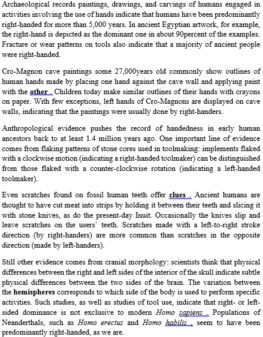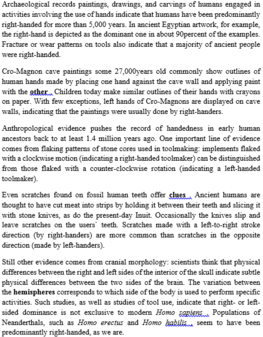Read the following passage and mark the letter A, B, C, or D on your answer sheet to indicate the correct answer to each of the questions from 36 to 42.
Homing pigeons are placed in a training program from about the time they are twenty-eight days of age. They are taught to enter the loft through a trap and to exercise above and around the loft, and gradually they are taken away for short distances in wicker baskets and released. They are then expected to find their way home in the shortest possible time.
In their training flights or in actual races, the birds are taken to prearranged distant points and released to find their way back to their own lofts. Once the birds are liberated, their owners, who are standing by at the home lofts, anxiously watch the sky for the return of their entries. Since time is of the essence, the speed with which the birds can be induced to enter the loft trap may make the difference between gaining a win or a second place.
The head of a homing pigeon is comparatively small, but its brain is one quarter larger than that of the ordinary pigeon. The homing pigeon is very intelligent and will persevere to the point of stubbornness; some have been known to fly a hundred miles off course to avoid a storm.
Some homing pigeon experts claim that this bird is gifted with a form of built-in radar that helps it find its own loft after hours of flight, for hidden under the head feathers are two very sensitive ears, while the sharp, prominent eyes can see great distances in daytime.
Why do homing pigeons fly home? They are not unique in this inherent skill: it is found in most migratory birds, in bees, ants, toads, and even turtles, which have been known to travel hundreds of miles to return to their homes. But in the animal world, the homing pigeon alone can be trusted with its freedom and trained to carry out the missions that people demand
In paragraph 2, when the author states that the owners "anxiously watch the sky" there is the implication that the owners _______________________.
A. want their pigeon to win the race
B. are sending radar signals to their pigeons
C.do not know whether the race began on time
D. do not trust the rules set down by the judges





Đáp án A
Ở đoạn 2, khi tác giải trình bày rằng những người chủ “ nhìn bầu trời một cách đầy lo lắng” thì có ngụ ý rằng những người chủ
A. Muốn chim bồ câu của họ chiến thắng cuộc đua.
B. Đang gửi những tín hiệu rada cho chim bồ câu của họ.
C. Không biết rằng liệu cuộc đua có bắt đầu đúng giờ hay không
D. Không tin tưởng những quy định do ban giám khảo đặt ra
Dẫn chứng: Once the birds are liberated, their owners, who are standing by at the home lofts, anxiously watch the sky for the return of their entries